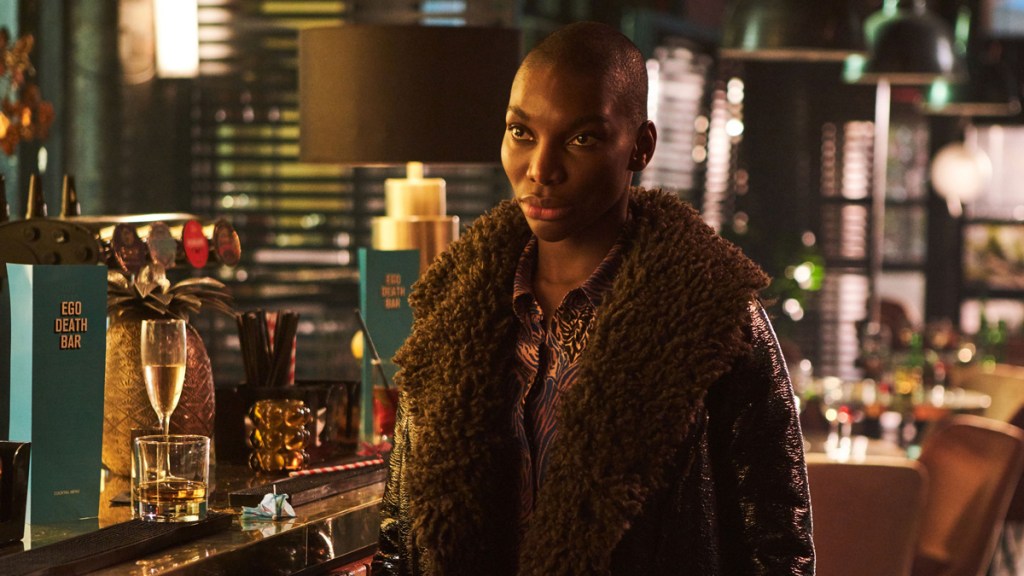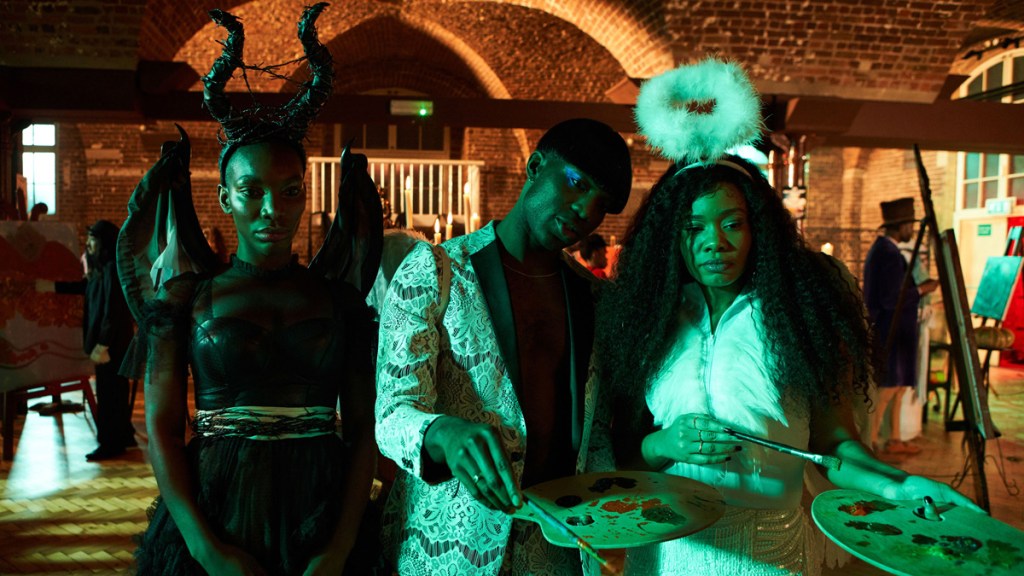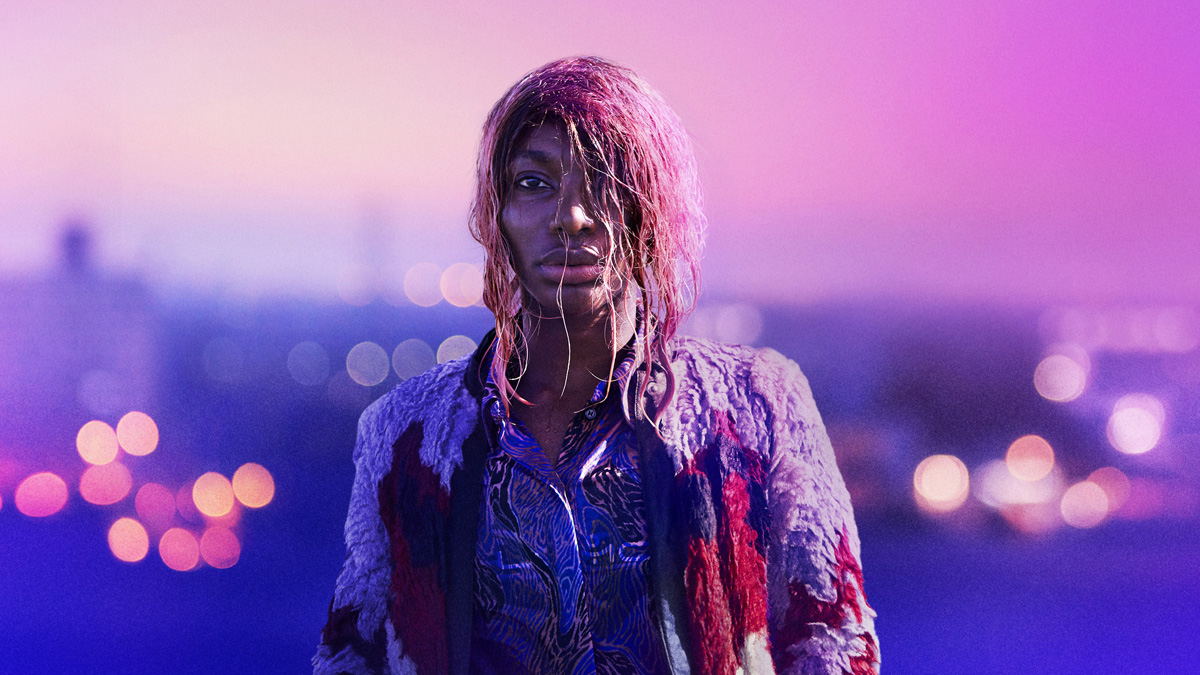Warning: contains spoilers for the I May Destroy You finale
Michaela Coel’s I May Destroy You is a tour de force creation of laser-focused storytelling. A creator working at the current height (but clearly not yet the apex) of her power, Coel’s take on trauma and consent is the kind of prestige exploration that only a survivor could write. The series starts with Coel’s pitch-perfect take on the nuts and bolts of trauma, from the intrusive thoughts and sarcasm toward art therapy to the ringing we hear when main character Arabella is triggered to Arabella downplaying her own trauma by comparing it to various global tragedies. But Coel goes beyond that and puts every kind of consent under the microscope, pushing the audience to look at the aspects of rape culture that make us the most queasy, even if – especially if – they’re inside ourselves.
With Arabella’s drug-induced blackout in the first episode, I May Destroy You sidesteps the depiction we’re most used to seeing of sexual assault – detailed, graphic imagery of “what happened” – in favor of a more guttural and nuanced portrait of the thing that lasts: surviving sexual assault. As a result, the show has so much more to say than the usual fare, staying with Arabella and her friends for at least a year to see the changes great and small after the assault, and to examine consent across their lives from a number of different angles. Only someone who’s spent so much time swimming in this topic could write it so intensely and accurately.
Usually, when rape and sexual assault are depicted in mainstream storytelling, they are used as a storytelling device — a time-saving shorthand to further the plot for a male character who has a relationship with the victim, to show how deeply evil the perpetrator is, or perhaps to make the victim seem more sympathetic or to provide her with sufficient motivation to be an active protagonist in her own story. (Why else would LadyCops exist?) These tropes are discussed in heteronormative terms because most sexual violence on screen ignores the reality that men are survivors too, and that LGBTQ people are disproportionately affected, as are, for that matter, BIPOC (Black, Indigenous, and People of Color).
Even when stories are primarily about sexual violence, the narratives tend to follow the same repetitive beats. The rape revenge movie, the Good Survivor™ who self-actualizes their way to justice—and also love! It’s lazy storytelling to retread the same arcs, but with the exception of a wonderful few, like Sweet/Vicious, The Assistant, The Magicians (which righted itself after a triggering start) and hopefully the forthcoming Promising Young Woman and Run, Sweetheart Run, it’s near-universal.
Enter I May Destroy You.

Drawing from a personal experience of sexual assault, Michaela Coel’s 12-episode show is a fictional depiction of Arabella, a millennial writer living in London who was drugged and raped while out for a drink one night when procrastinating on a deadline. Like many survivors, it takes Arabella some time to accept the label the police investigators assign to what happened to her, though they generally treat her well, certainly better than we’d expect here in the States. Don’t get too comfortable, though – for as well as Arabella is treated, her friend Kwame, a queer Black man, experiences something entirely different when he goes to report a rape.
From the beginning, it’s clear the investigator doesn’t understand sex between men and isn’t interested in taking Kwame’s information. He is afforded no privacy while the investigator takes his statement, while a door with a sign saying it must be closed is clearly left open. Kwame isn’t offered support or understanding – instead there’s a sense of judgment surrounding the circumstances, since he used a hookup app. The investigator brushes off the possibility of taking a DNA sample since, they say it wouldn’t prove anything since they had consensual sex, ignoring that at least then they would know it was the correct person. The entire interview is far too casual, with the investigator asking if he was penetrated or not almost as an afterthought, on their way out the door. We don’t have to imagine what an interview with a woman reporting sexual assault would look like, because we’ve just seen it, a few episodes ago. Even between two young Black Londoners with immigrant parents, there’s a hierarchy of privilege and treatment.
Kwame internalizes his experience and withdraws from the world. It takes his friends a long time to realize something is the matter, in part due to concern over Arabella. When they do, Arabella isn’t supportive and doesn’t equate their experiences, even going so far as to accuse Kwame of manipulating or somehow violating the consent of a woman he slept with by not disclosing his sexuality, as though anyone is entitled to that information in the first place. (Kwame primarily sleeps with men but patiently explains that it’s a spectrum and that after being raped, sleeping with men isn’t safe for him, he’s interested in sleeping with women, and he’d like to explore that.) For her part, the white woman Kwame slept with seemed all too eager to fetishize a Black man and then sing the n-word and use the f-word. He called her out on the latter, she became indignant, and she weaponized the language of consent and rape culture to turn the conversation off of her use of slurs and onto him, calling him cancelled and a predator. In her words, “I guess anything that you may have found offensive you wouldn’t have heard if you hadn’t have come into my house under false pretenses,” and I truly hope she warmed up before that stretch.
Read more
The fact of being a survivor alone doesn’t make a person an expert on all things consent and sexual violence. Some survivors choose to go deep on the research, become a certified rape crisis counselor, earn their Master of Social Work degree, or otherwise advocate for survivors in a technical capacity above and beyond their personal experience. But many do not, and it takes years for those who do. Survivors are not infallible; some of the most damaging, victim-blaming things I’ve heard have come from survivors in the early days of denial or crisis, including myself. The awful things we’ve said are usually more about the internalized shame and doubt we’re feeling about our own story than anyone else.
In Arabella’s case, becoming a warrior-survivor makes her feel strong and safe. Her and Terry’s limited understanding of sexuality causes them to be confused by a gay man wanting to have sex with a woman at all, and she gets hung up on that rather than seeing kinship with Kwame and understanding that sex with men is a safety issue for him at the time. Instead, she sees kinship with the racist, sexist white woman Kwame had the misfortune of hooking up with. At this moment in time, Arabella is more comfortable placing Kwame in a box where all men are perpetrators, and any information not shared is manipulation, rather than viewing him as a fellow survivor.
It’s completely understandable. It’s sadly not all that rare. And it’s completely unfair to Kwame. It’s also the kind of messy dynamic most people would not dare to write, let alone lay at the feet of a lead character who’s a survivor of sexual assault. But there’s more humanity in Coel’s take on survivors as fumbling, imperfect, traumatized beings than some sort of beatified victim persona or the ruined/broken/fallen woman trope. Survivors aren’t perfect or magic; we’re people healing from trauma. And for a decent part of the series, Arabella, like so many of us, is pretending she either has nothing to heal from or that healing isn’t an active pursuit. Wouldn’t it be weirder if we were just completely fine?
Coel captures the difficult phenomenon of social media as a public survivor. The push-pull of receiving much-needed support from unseen online followers, while fending off disturbing efforts from trolls and an inner urge to lean too hard on strangers. Social justice can make a survivor feel powerful, and online activism is the most readily accessible for most survivors. At any time of the day or night, you can send off a tweet or post and hear back from a chorus of support – or not. But like any coping mechanism, it helps until it doesn’t.

Being a public survivor turns you into a beacon for others in need. In many ways it’s a good thing, but receiving dozens of survivor stories every single day can become overwhelming. How do you respond adequately to all of them? How do you connect people to help if they need it? How do you read them all without triggering yourself? Coel deftly shows the realistic downsides of social media activism without lampooning it. It’s not that social media is ineffective, so much as it consumes Arabella. The survivors in her DMs need real professional assistance, something she can’t provide – she’s still going through it herself. As things come to a head toward the end of the season, Coel shows the other side of what it means to be a personality who becomes famous for their social posts on a traumatic topic. Yes, Arabella says a lot of smart things about sexual violence. But Arabella also needs to put down the phone and eat a real meal, get a good night’s sleep, go to group therapy, and spend time in the present tense with her friends.
Finally, there is the show’s ending. One could be forgiven for mistaking I May Destroy You for a whodunnit. After all, the primary question most sexual violence narratives ask are who did it, what exactly did they do, how devastated is the victim, and how will the perpetrator be punished? But in its kaleidoscope of possible endings and Arabella’s command that all of her perpetrator’s various incarnations leave her apartment, she and the show make it clear that this isn’t really about her perpetrator after all. It’s about Arabella, her healing, and the people who make her life full and strong. So she goes to the garden and hugs her neglected roommate Ben, their tending of plants (at publisher Sally’s suggestion) marking the passing of time.
While many survivors desire justice, the law and order portion of surviving is limited, if it exists at all, compared to disclosing to loved ones, getting triggered in public, reevaluating relationships with victim-blamers, having tough conversations about consent, negotiating how to keep a job and housing with lowered productivity – all things Arabella has worked through over the course of the season. Viewers may want to see fire and brimstone, but that would be unrealistic. It also might not even help. And as the various scenarios played out, presumably all versions of how it could have gone down plucked from Arabella’s mind, it’s not like survivors haven’t thought about this before. Instead, a part of her heals and moves on. She doesn’t forget, but she’s not in crisis or living on a knife’s edge anymore. She has enough psychic distance to write her book. She can put her friends’ needs above her own again, when they need her.
The ending may not feel satisfying to everyone, but it’s real. It certainly resonates with me, in spite of the somewhat stressful, chaotic nature of watching her spend so much time in the presence of her perpetrator. These are all very real dynamics that are playing out all the time, and the public conversation is catching up to that. It’s time that our media did too, rather than retreading the same old ground, but it’s not altogether surprising that only someone who’s thought about the topic so deeply would know how. The world of surviving sexual violence is rich with stories and experiences, if only people would actually look. That’s why it’s so frustrating to see the same stories told about this topic over and over again. But when survivors like Michaela Coel are in the driver’s seat, everything changes for the better. In I May Destroy You, she slices through the quaint stories we’re used to hearing, in favor of nervy narratives that reveal queasy truths we might not yet be ready for. One might assume that the show’s title is the perpetrator speaking to Arabella, or vice versa. But as we the audience hide from the truth about rape culture, wrapped up cozily in our own myths and assumptions, it turns out the title is the voice of Coel, speaking head on to all of us, with a glint in her eye.


